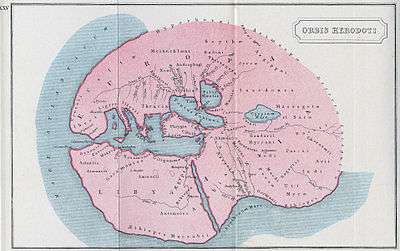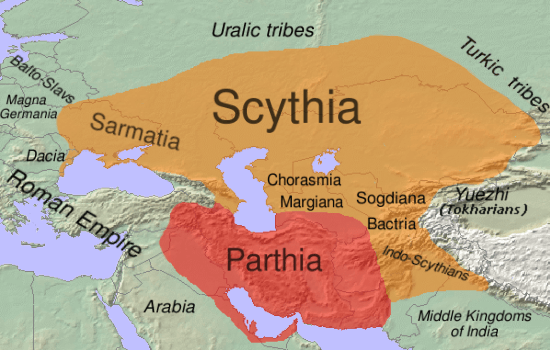Neuri
According to Herodotus the Neuri sometimes also Navari were a tribe living beyond the Scythian, one of the nations along the course of the river Ὕπανις Hypanis (Southern Bug River), West of the Βορυσθένης Borysthenes (Dniepr river), roughly the area of modern northern (initially north western) Ukraine (historic Volyn) and southern Belarus.

Herodotus's account
According to Herodotus the Neuri (Νευροί) were the furthest tribe beyond the Scythian farmers along the course of the river Hypanis[1]. The river Tyres was the boundary between the Scythian and the Neuri,[2] who followed Scythian customs.[3] One generation before Darius I's campaign to Scythia (512 BC), the Neuri were driven from their land by an invasion of snakes, which forced them to live among the Budini.[4]
Herodotus also recounts the tale that, once a year, each of the Neuri became a wolf for a few days before returning to their previous form[4]. Herodotus "himself does not believe the tale, but he says that those who tell the tale swears that it is true".[4] This tale was later also mentioned by Pomponius Mela[5]
Modern interpretations
Olof von Dalin
The 18th century Swedish historian Olof von Dalin wrote that the Neuri were a mixture of races: Scythians, Greeks and Hebrews who accompanied the Budiner or "Shepherd Scythians", to the Swedish islands around 400 BC. This exodus was the result of pressure from the Macedonians.
- the Neuri seem to be remnants of the Ten Tribes of Israel which Shalmaneser, king of Assyria, brought as captives out of Canaan... [When one realises that] the language of the ancient Finns, Lapps and Estonians is similar to the Hebrew and even that this people in ancient times reckoned their year's beginning from the first of March, and Saturday as their Sabbath, then one sees that the Neuri in all probability had this origin.[6]
Dalin's theory is regarded as quaint by modern scholars of linguistics, who can find no connections between the Semitic languages and the Neuri.
References
- Herodotus 4.17
- Herodotus 4.51
- Herodotus 4.105
- Herodotus 4.105
- Pomponius Mela's Description of the world 2.14
- (in Swedish) Svea Rikes Historia, 1747, Vol. 1, pp. 54–55
- Gimbutienė, Marija. "Bronze Age cultures in Central and Eastern Europe". books.google.lt. Retrieved 23 May 2020.
- Matthews, W. K. "Baltic origins". p. 51. Retrieved 23 May 2020.
Sources
- Boardman, John; Edwards, I. E. S. (1991). The Cambridge Ancient History. Volume 3. Part 2. Cambridge University Press. ISBN 0521227178. Retrieved March 2, 2015.CS1 maint: ref=harv (link)
External links
Chisholm, Hugh, ed. (1911). . Encyclopædia Britannica (11th ed.). Cambridge University Press.
